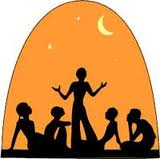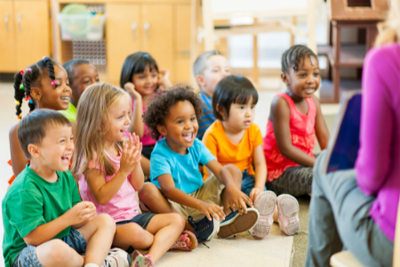
Free Choice Blog
After the completion of the Masters in Library and Information Sciences (MLIS) degree program, I hope to obtain a media specialist position with an elementary school. I love storytelling with my own children and the kindergarteners that I work with in my full-time position. I enjoyed reading how storytelling can be implemented into the curriculum at a school with helping the students tell their own stories. For my free choice blog this week, I would like to highlight how media specialists can implement storytelling curriculums and the benefits of storytelling on the development of the students.

Greene and Del Negro (2010) highlight the uses of storytelling in the curriculum through related arts in a school. Anne Shimojima, a director of an Instructional Media Center, has introduced the art of storytelling to elementary students and in turn, involved the students with the storytelling process. (Greene and Del Negro, 2010). Students are active participants with the stories in kindergarten and then transition to learning story elements in first grade (Greene and Del Negro, 2010). Next, students concentrate on folklore in second grade, third graders film DVDs of their own stories, and by fourth grade, the students themselves are the storytellers (Greene and Del Negro, 2010). I found this curriculum fascinating how Anne Shimojima incorporated all aspects of storytelling. She adapted the curriculum to each grade level of students and made the act of storytelling compelling to that grade level. In addition, the curriculum that Anne Shimojima adapted in the media center encourages collaboration with the classroom teachers. While students are developing their stories in fourth grade, classroom teachers help the students with character development (Greene and Del Negro, 2010). Anne Shimojima’s project of storytelling provided collaboration between the students, classroom teachers and media center and helped develop the children’s passion for storytelling.
I was inspired to learn about the storytelling curriculum and found another example that based the storytelling lessons in the school around a festival at the end of the storytelling program. Higgins (2008) found that the students from a school in inner city Philadelphia actually craved the roles that storytelling provided to them. Students proved to enjoy acting out stories and creating different voices for characters (Higgins, 2008). Once again, collaboration between the classroom teachers and media specialist assisted with the ultimate development of the stories. Higgins (2008) provides an additional model for media specialists to incorporate storytelling into the media center curriculum and give students the confidence to be their own storytellers. Higgins developed an eight-week program for third graders that ended with a festival to perform the stories that the students had been working so hard on (2008). Reading about the incorporation of storytelling into the curriculum of media centers makes me even more excited to become a library specialist. Furthermore, students benefit from storytelling with educational and personal goals.
Storytelling provides students with many educational benefits. Haven (2010) found that storytelling in libraries increased the literacy of students. Storytelling assisted with the enhancement of students learning story structures: a beginning, middle, end, characters, problems and solutions (Haven, 2010). Once students understand story structure, reading comprehension increases (Haven, 2010). Librarians can help with this understanding by pausing and asking pertinent questions about the story. Havens (2010) also found that effective storytelling by librarians helped with improvement in students’ writing. Stories help students cognitively process the elements of a story, which in turn helps with comprehension and writing.
When media specialists provide students with the resources to perform their own stories, they are also helping students develop on a personal level. Greene and Del Negro (2010) found that students’ self-esteem and confidence increased through storytelling experiences. Students choosing their own stories helps build self-expression. “We learned that the stories that make a difference are often ones that come from our own lives” (Higgins, 2008, p.31). Students referenced the confidence built through overcoming fears and feeling prepared to tell their stories (Higgins, 2008).
In conclusion, as we have been learning in our weekly modules, everyone has a story to tell and that includes children. Why not give students the education to express themselves through storytelling? I am excited about the prospect of introducing storytelling lessons into a future media specialist role. In addition, I feel that it is an ideal opportunity to collaborate with classroom teachers on story development. Storytelling for students helps increase not only educational goals but also personal development.
References
Greene, E., & Del Negro, J. M. (2010). Storytelling: Art and technique (4th ed.). Libraries Unlimited.
Haven, K. (2010). The story of the story: Research support for the school librarian’s role in teaching writing. School Library Monthly, 26(6), 39–41.
Higgins, C. (2008). Gather ‘round the campfire Engaging students and creating storytellers. Knowledge Quest, 36(5), 28 – 34.
Weekly Readings

.jpeg)


Hi Jessica,
ReplyDeleteI enjoyed reading your blog this week as I found that you and I share a lot of the same feelings and excitement toward the role of the media specialist. I am also planning on working in an elementary school library and find myself getting more and more excited about implementing storytelling in the library as we progress through this course. I am so glad that you discussed the examples mentioned in our text about the various ways to engage students as storytellers throughout different grade levels. I also found these examples to be inspiring, especially the complex and engaging fourth-grade unit that was explained in depth. As you pointed out in your post, storytelling activities such as these are a great way to promote academic and social skill development and encourage collaboration between librarians and classroom teachers. Considering my experiences as a teacher, my biggest fear is that classroom teachers will have too much on their plates to truly buy into these storytelling experiences that we will be promoting in the library. I think having examples like these to go by will help showcase the potential of these types of projects as long as they are coupled with proper planning time and specific curriculum or standard alignment. Hopefully, we will be able to show all our fellow educators just how powerful storytelling can be!
Thanks for sharing!
-Christina Lunetta
Jessica,
ReplyDeleteI loved reading your post, it was so informative! I really enjoy the idea of having a festival for storytelling. I have never heard of this idea, but I think having the kids work towards an end goal would be a great motivator. I know the parents would love to see all of the kids' hard work too. I was also interested in learning about storytelling this week so I looked at different ways people host storytime. My favorite was probably the idea of yoga story time because it gets the kids moving.
This was a great blog post, Jessica! I am planning on working as an elementary school librarian after graduating from the program, and this blog post was so helpful in learning more about how media specialists can use story telling. I appreciate how you talk about the importance of collaboration between the classroom teacher and the media specialists because it is such a vital part of our jobs. I also loved looking at Anne Shimojima's webpage that you linked. I have filed it in my resources bookmark on my laptop to reference again one day.
ReplyDeleteHey Jessica,
ReplyDeleteI wish you luck on acquiring a media specialist position after graduation. I have several friends and colleagues who are also pursuing media specialist positions. These jobs are incredibly worthwhile and do so much good for children. Based on your enthusiasm for the job I think you will do great.
I completely agree about helping students learn to tell stories. As you said, we all have a story to tell. I am passionate about storytelling because many people throughout my life have encouraged and supported me and my interest in storytelling. Working that into the curriculum so that it is a standard part of a child's education is something I whole-heartedly endorse. Your post does a great job of detailing all the good storytelling can do for young students. Good work!
All the best,
-John Fowler